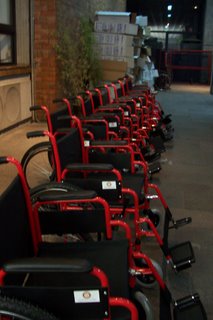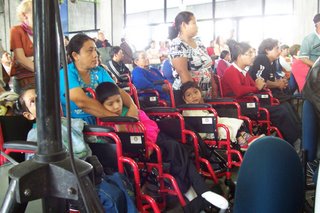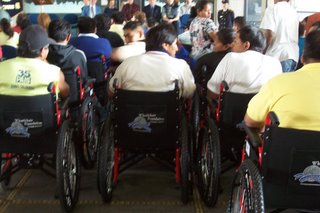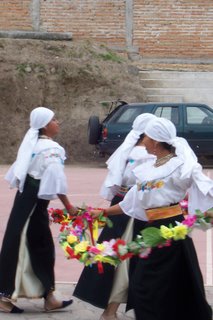No words can do it justice…
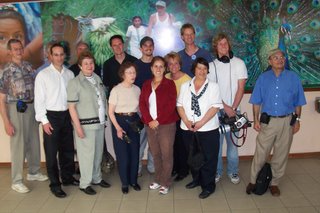 But if I had to pick one it would be “transformational”, both for the wheelchair recipients and the donating team. This past Monday I began a four-day trip with Colorado Springs Rotary members and members of a truly inspirational organization called Adopt-a-Village (formerly known as Hope Alliance). I was so impressed and inspired by this wonderful group of people. It was a motley crew, and each person had their strengths and something to contribute to the group. They all came with the single goal
But if I had to pick one it would be “transformational”, both for the wheelchair recipients and the donating team. This past Monday I began a four-day trip with Colorado Springs Rotary members and members of a truly inspirational organization called Adopt-a-Village (formerly known as Hope Alliance). I was so impressed and inspired by this wonderful group of people. It was a motley crew, and each person had their strengths and something to contribute to the group. They all came with the single goalof distributing wheelchairs to disabled Ecuadorians, and for many it was their third trip to South America because they had done similar projects in Peru in prior years. I thought my Saturday experience was great, but the four days that we spent delivering chairs in Santo Domingo, Bahía, Portoviejo, Ambato, and Latacunga made an impression on me that I had never anticipated. This trip made me so grateful and so painfully aware of how fortunate I am to have the gift of complete health and mobility. The warmth, kindness, and true appreciation of everyone we came across, be it other Rotary clubs, wheelchair recipients, or their family members, had a way of filling me with a sense of purpose that I don’t think I’ve ever experienced before. The wheelchair recipients we met all had unique stories, and some just made me want to scream with anger when I learned why they were in a wheelchair. I had the opportunity to do a bit of interviewing and translating into English, which was wonderful way to learn about the stories of many of the recipients. I think the cases that struck me the most were those of young women because their reality hit all to close to home. I could very easily be in their condition. It made me consider the injustice of chance and circumstance. Why did I receive the good fortune of health, education and a stable life while other young women find themselves immobile and painfully poor? I deserve these things no more than they do. I met one young girl (26) who simply got sick one day. The next day she woke up paralyzed. For the past seven years her loving and dedicated brothers have transported her by carrying her wherever she needed to go. With the chair she said that she can now sit and have a small store maybe, or better yet, she can do simple but important things, like going shopping for clothes with her mother.
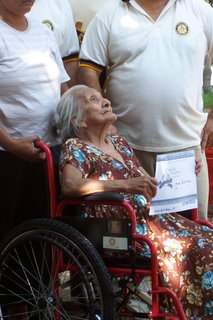
The girl who had the largest impact on me, however, was unable to speak. We all went to a local hospital to deliver a chair to this young woman. We entered the hospital, and just by looking at the quantity of people, feeling the stifling heat, and seeing the dirt on the walls, I knew that I needed to try really hard to put the judgment card aside and just take in what I was experiencing. We entered the room and spoke to her mother and father, who were dutifully by her side tending to her. They told me that she was a perfectly healthy, pregnant 20-year-old girl, and she actually was in such good condition that she walked herself to the hospital to give birth. Due to complications, she had to receive anesthesia for a Cesarean section, but the anestigeologist gave her too much, which not only paralyzed her but affected her mental capabilities as well. This occurred five months ago, and the parents are still paying to keep their daughter in the hospital. They are thousands of dollars in debt, which is money they don’t even have. To make matters even worse, the baby died shortly after birth.
As with anything, we experienced the good and the bad. Fortunately, we saw, in my opinion, many more joyous cases than cases like the one I mentioned above. For instance, we met a law school student who was very excited about his new possibilities for mobility. We met grandmothers and grandfathers who came with their families to receive the chairs. We met young children in need. One boy in particular stands out because he had no legs and only one arm because of a horrible fire that he was in. We met people of all ages and needs, and giving the chairs was a beautiful sight to be had. They were so proud to begin anew, and sometimes their loved ones cried in happiness. I honestly believe that we witnessed countless liberations- liberations of spirits and physical bodies that had been confined for years. In some cases we literally saw an instant smile and transformation as the person lifted their head to face the world with new confidence. Others cried. The touching part was to see this change regardless of how it manifested itself. Some people were carried in on the backs of their loved ones. One man in particular crawled in; he literally came in on his hands and knees. Another was rolled in on a chair that his family had made with furniture wheels on the legs to create a make-shift wheelchair. I just stood in the hallway and watched as a flood of recipients passed by me. How does one go unchanged after seeing so many people who have battled with disability? It wasn’t their need that spoke to me most, however. It was their strength, perseverance, ingenuity, determination, and tenderness. Seeing such varied human conditions spoke to me. They are amazing people.
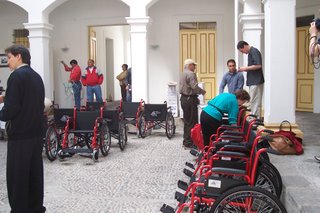
The organization for this project was remarkable. The U.S. clubs had raised the funds, and the Ecuadorian club arranged for the logistics. Every chair recipient had to register themselves, so when the day came to deliver the chairs, we had exactly the right number of chairs (big and small), which is a feat of organization. It was heart wrenching, however, when people showed up to the events who weren’t registered to receive a chair. In many cases they were worse off than those on the list, but we had to refuse them. I was elated when in some of these cases we could spare an extra chair, but how exactly do you tell a 90-year-old woman that you can’t help her when you look at her obviously abused and almost gangrened feet? It was the reality of the situation, and I think this fueled inspiration to return again.
I had never experienced this kind of humanitarian and philanthropic giving in the past. I think that during this trip we all felt like actualized agents of change. It was simple: we treated others how we wanted to be treated. We gave metal and rubber- nothing more. But human interaction is never that simple, and it’s always greater than the sum of its parts. We experienced humanity. People helped people- again, nothing more. It made me consider how complicated we make our lives sometimes, and how in the midst of noise and haste, we lose sight of the simple importance of looking around us. As many recipients commented, they received new legs. They also received independence, confidence, and a new willingness to positively change their life.
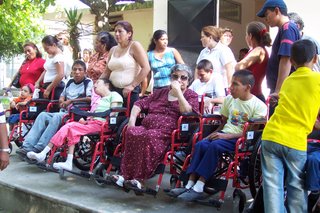
We thrived off of tearing open the wheelchair boxes, assembling the chairs, creating our assembly lines of adjustments and tweaking, and finally, taking Polaroid pictures of the recipients and their families. I know this is painfully cliché, but this week was as much a gift to me as the chairs were to the people I think. I changed because of it. On a final note, after a week of giving of themselves to their last shred of energy, the members of the Colorado Springs group donated a massive amount of clothing to give to a local foundation. The hearts of these people are so enormous that, using the words of a trip member, I don’t know how they continue fitting in their chests.
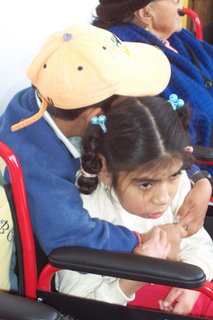
A huge THANK YOU is due to the North Colorado Springs Rotary club, Adopt-a-Village, Quito Rotary Club, and finally, the Rotary Club of Downtown Gainesville for making this all possible. Pockets of peace and change are possible. They are taking place right before my eyes in Ecuador.
